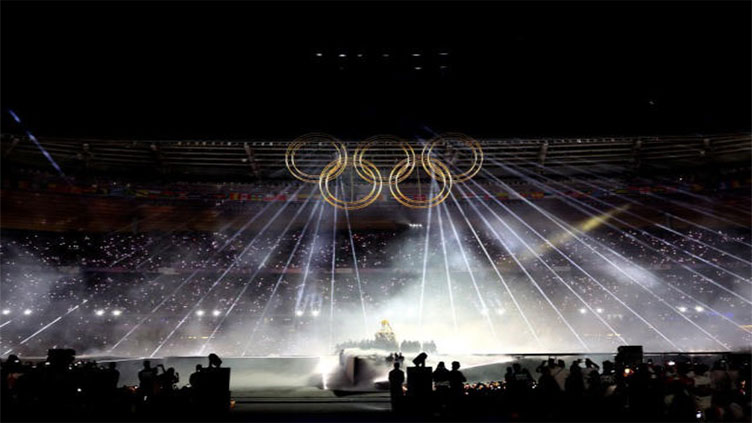Don't dream it's over: Paris's Closing Ceremony pits Old World splendour against Hollywood spectacle

Sports
Paris passed the Olympic torch to Los Angeles in a cryptic and sometimes chaotic Closing Ceremony.
PARIS (AFP) - Paris passed the Olympic torch to Los Angeles in a cryptic and sometimes chaotic Closing Ceremony in the Stade de France Sunday night, with hundreds of athletes unexpectedly mobbing the stage during a performance by French indie rock band Phoenix. American action star Tom Cruise rappelled in from the top of the stadium to set the flag off on its journey to Los Angeles, making it clear that the 2028 Games will be leaning heavily into Hollywood glamour.
Seen under the last rays of the summer sun, the stage set up for the Closing Ceremony of the Paris Olympics in the Stade de France looked like nothing so much as some fragile thing that had fallen from a great height, its raw edges spilling across the stadium grounds seemingly at random.
It was only when darkness fell across the arena and the stage's shattered lines lit up with a cold white light that its shape became clear: the thousands of spectators filling the stands were staring at a map of the world, alive in the flickering light, shining through a rising mist.
In the upper reaches of the arena, a golden orb began to unfurl. Slowly, a shimmering figure descended to earth, more insect than angel, alien in its antiquity. As its armoured feet touched the stage, masked grey creatures began to crawl across the arena, taking their positions beside five vast metal wheels lying abandoned across the earth.
At the golden figure's silent urging, they set to work, hauling the great wheels from the four corners of the world to raise them into the sky above the stadium as the five Olympic rings.
This, perhaps, was the message underlying the elaborate splendour of the Paris 2024 Closing Ceremony; a gesture of acknowledgment, of gratitude, to the tens of thousands of people who have laboured unseen to create the grand spectacles of the past two weeks.
The organisers of the Paris Olympics wanted a Games that the world had never seen before, and by all accounts they've succeeded. From the delirious Opening Ceremony on the banks of the River Seine to the venues built in a matter of months all over Paris to allow the world's athletes to compete in the heart of the city, the Games' organisers have gone all out to put the French capital on full display.
On Sunday, those same organisers gave thanks to the countless men and women who had made history these past two weeks, and who had not made it on their own.
Nestled in the brutalist Stade de France in the suburbs of Seine-Saint-Denis north of Paris, the Closing Ceremony was always going to feel a little cosier. As hundreds of athletes filed interminably into the arena, smartphones on hand to film the crowd filming them, it seemed that the evening was going to strike a more subdued tone than the literal Bacchanalia of its opening night.
But while the night's spectacles were less astounding than the frantic delights of the Opening Ceremony, they were no less moving. Once the rite of the Golden Voyager was over, the stage was lit up for more contemporary fare, including performances by French indie rock group Phoenix, Belgian singer Angele, French producer Kavinsky, Cambodian rapper VannDa and an appearance by Vampire Weekend frontman Ezra Koenig.
It all proved too much for the assembled athletes. Hundreds of Olympians clambered up onto the stage to enjoy their own up-close-and-personal concert. Only when a firm voice thundered over the loudspeakers in French and English that the Games' cherished champions were kindly invited to get off the stage immediately did it become clear just how much the evening had gone off-script.
Once order had been restored, it was time to return to the sad business at hand – passing the torch to Los Angeles, who would have another four years to figure out how to clear the high bar set by the 2024 Games.
We got a glimpse of just what that might look like when the spotlights swivelled to the upper reaches of the stadium, where action star Tom Cruise was rappelling down to the stage in a stunt straight out of Mission Impossible.
The actor made his way slowly through the throngs of cheering athletes, stopping for selfies, shaking hands and doing everything in his power to make sure the world remembered that while the Americans had not invented celebrity, they may well have perfected it. And then he was off, Olympic flag in hand, hurtling out of the stadium on a motorcycle in true Hollywood style – that is to say, straight into a pre-recorded action sequence.
As the crowd craned to see the screens overhead, it slowly became clear that the rest of the US's Los Angeles showcase would be taking place half a world away in the Long Beach sun. Performances by Snoop Dogg, Dr Dre, Billie Eilish, the Red Hot Chili Peppers – it was West Coast through and through, and it's possible that some of that magic would have been lost against the grey concrete expanse of Seine-Saint-Denis.
Still, it stung. As the lights came back on in the Stade de France to reveal exhausted athletes sprawled around the floor among heaps of spent confetti, you couldn't shake the feeling that the party was over. But then the lights dimmed again, and French singer Yseult rose slowly to the stage, draped in mourning black.
Her song choice spoke volumes – Frank Sinatra's "My Way", a song that found worldwide fame in English but that was written first in French. As her voice filled the stadium, the sky above the Stade de France shone with fireworks, setting the crowd alight for one last time.


